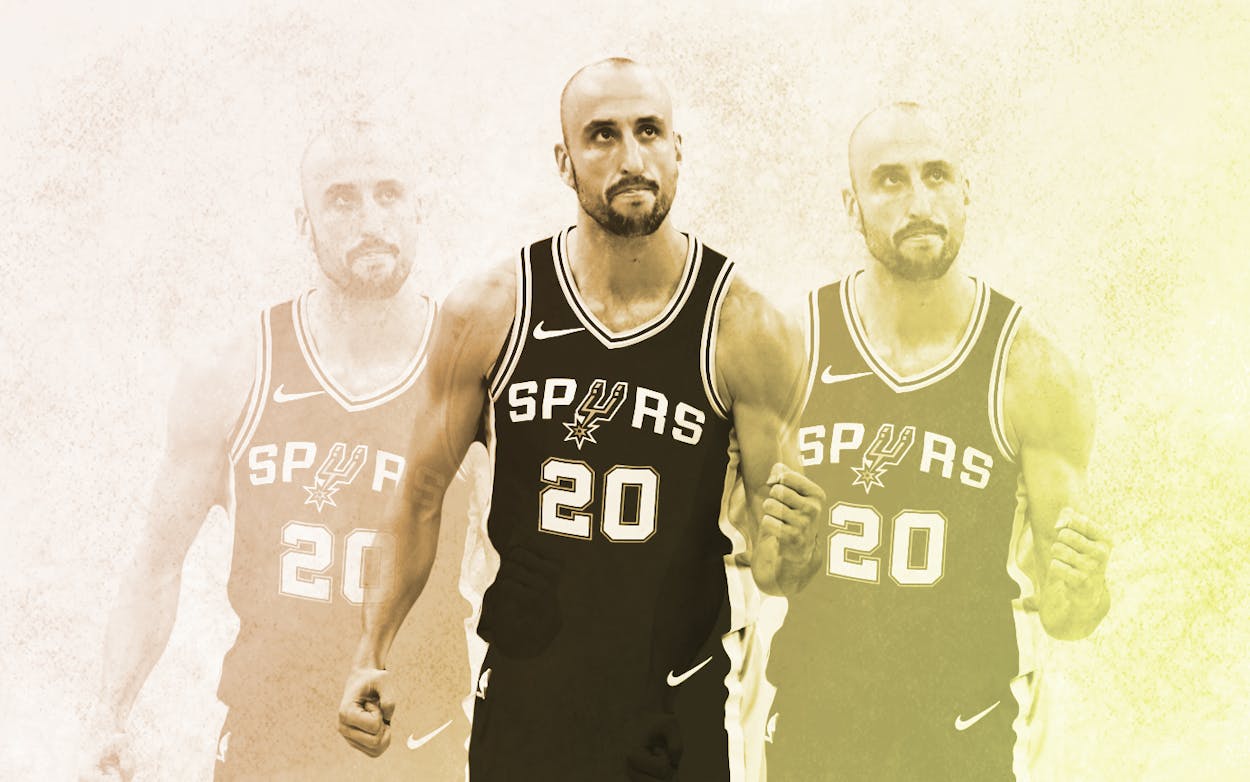The first time Gregg Popovich saw Manu Ginobili, he watched a scrawny, wiry guy moving at a frenetic pace up and down the court. It was a low-quality tape of Ginobili’s time in the Italian league, but his ferocity was still recognizable—and strong enough to get him drafted in 1999.
Over a sixteen-year career, Ginobili created a legacy in San Antonio and solidified his place alongside Tim Duncan and Tony Parker as one of the Big Three, the winningest trio in NBA history. On March 28, a year after his retirement, the Spurs made sure he would always be remembered by retiring his jersey. At the emotional ceremony, his former coaches and teammates sang his praises as a packed arena of fans stayed an hour after the game, chanting and cheering as the #20 jersey was unveiled in the rafters of the AT&T Center.
On the court, Ginobili was inventive and infuriating, sometimes making a careless turnover in the heat of the NBA finals only to clinch a crucial game-winning three-point shot just minutes later. But his unpredictability is what made him fun to watch. Where Duncan was measured and Parker was quick, Ginobili was reckless with a passion that often paid off.
When Ginobili joined the Spurs as a backup for Steve Smith in 2002, he spent the majority of the regular season dealing with a sprained ankle, coming on and off the bench as Pop struggled to figure out what to do with him. But by the time the playoffs rolled around, he was someone to watch.
According to Pop, the secret was to just let Manu be Manu.
“In the beginning, he was like a mustang out in the field,” Popovich said at the press conference before the jersey retirement ceremony. “That’s how he lived his life on the court. He did things that were wild and fearless that won games. He didn’t need a whole lot of coaching from me.”
Just two years after his first season with the Spurs, Ginobili had improved drastically, making a name for himself in San Antonio and internationally. By 2005, the former benchwarmer helped secure two NBA championships, became an NBA All-Star, and was the scoring leader in Argentina’s first Olympic gold medal win in sixteen years.
Over the course of his career, Ginobili constantly changed the game. His behind-the-back passes and the Eurostep that he popularized have become staples on the court, and his fast and furious playing style led to some of the most iconic moments in Spurs history. Whether it was the game-winning block heard round the world against James Harden in 2017 or the dunk on Chris Bosh during the 2014 finals that he executed with a stress fracture, Ginobili played with a fire that was unmatched.
“He was essential to bringing a new type of basketball to the court,” said former Spur Boris Diaw. “Even his rivals had to respect him once they figured out they had a hard time stopping him.”
On his own team, Ginobili shaped the players who came after him. Tony Parker, who was an eighteen-year-old about to enter the NBA draft in 2001, still remembers the first time he saw Ginobili play. More recent additions to the Spurs came to lovingly refer to him as “Gramps” for his wisdom and contributions to the team.
“You were such an inspiration to me every day that it was just contagious,” Parker said to Ginobili on the court during the ceremony. “I became a better player just playing with you.”
The Spurs’s dynasty has been a crucial part of San Antonio’s identity for decades. Over five championship wins, the relatively drama-free franchise came to be known not as a one-man team, but as a well-oiled machine where each player played a role in its success. With Ginobili’s retirement, the city isn’t just saying goodbye to someone who helped build that dynasty—it’s saying farewell to someone who made fans feel like they were a part of it. While most of the Spurs are beloved, the bilingual basketball player from Argentina clicked with fans in the largely Hispanic city in a way the others couldn’t.
When Ginobili was signed, he had no idea where the Spurs were, and when he arrived, no one could’ve known what to expect from him. But twenty years later, he left as a star.
“I came to San Antonio without knowing anything about the city, with a carry-on full of doubts and uncertainty,” he said at the ceremony. “All of a sudden, I’m on the court and you guys are going nuts. It felt like you guys had my back.”
- More About:
- Sports
- Spurs
- San Antonio








